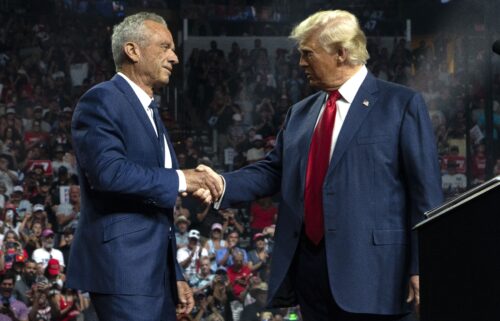What’s next for front-runner Elizabeth Warren?

With 106 days until the Iowa caucuses and a record number of Democratic candidates, the 2020 election is already in full swing. Every Sunday, I outline the 5 BIG storylines you need to know to understand the upcoming week on the campaign trail. And they’re ranked — so the No. 1 story is the most important of the coming week.
Tell your friends to subscribe to The Point newsletter!
5. Biden bucks: Don’t lose sight of this amazing fact: Astronaut and first-time Senate candidate Mark Kelly had more money in the bank ($9.5 million) than Joe Biden’s presidential campaign ($8.98 million) at the end of September.
That’s Joe Biden. The three-plus decade senator. The eight-year vice president. The front-runner in the 2020 race since the moment he got into it. (Until now, that is. More on that below.)
Biden’s fundraising problems aren’t actually all that surprising. He’s never been much of a fundraiser — or enjoyed doing it. And he never built the small-dollar national network that more liberal candidates likes Vermont Sen. Bernie Sanders and Massachusetts Sen. Elizabeth Warren have accrued.
None of those rationalizations change the fact that Biden has considerably less money to spend in the final 100 days before people start voting that any of his top rivals — including Sanders, Warren and South Bend Mayor Pete Buttigieg.
How can Biden change that reality? He probably can’t. If he wasn’t able to raise money well (and easily) as the clear front-runner, he’s going to have a much harder time convincing people to give him money given the changing dynamics in the contest.
4. Bernie’s back?: That’s the message coming out of Sanders’ campaign as he seeks to change the subject from his recent heart attack and the is-he-too-old-for-this? conversation that event has spurred.
Sanders’ efforts to move on got a big boost over the weekend when New York Rep. Alexandria Ocasio-Cortez endorsed him over Warren. “It wasn’t until I heard of a man by the name of Bernie Sanders that I began to question and assert and recognize my inherent value as a human being who deserves health care, housing, education and a living wage,” Ocasio-Cortez said at a rally announcing her 2020 pick.
What happens next? Well, Sanders has the AOC endorsement as well as $30+ million in the bank — two very good things with about 100 days left until Iowa. The question now becomes: Does he have another issue on the campaign trail related to his health or age? If not, Sanders’ heart attack might seem like a million years ago by the time Iowa Democrats turn out to vote in the caucuses. But if Sanders has any sort of problem between now and then, it’s likely the end of his campaign.
3. The super-weird Hillary vs. Tulsi dynamic: Hillary Clinton started one of the strangest news cycles in the 2020 race at the end of the last week when she seemed to suggest that the Russians were “grooming” Hawaii Rep. Tulsi Gabbard to run as a third-party candidate. Gabbard, thrilled with the unexpected chance to battle with one of the biggest figures in the party, called Clinton the “queen of warmongers, embodiment of corruption, and personification of the rot that has sickened the Democratic Party for so long.”
What now? Well, Buttigieg gave the story a bit more fuel Sunday morning. “I don’t know what the basis is for that,” he said of Gabbard on CNN’s “State of the Union” with Jake Tapper. “But I consider her to be a competitor. I respect her service.”
Does this become a story that all of the major contenders on the Democratic side have to respond to? And do any of them take it as an opportunity to distance themselves from the Clinton era that many Democrats would like to put behind them?
2. Trump slump … dump?: I’m hesitant to predict any sort of major walk-away from President Donald Trump by congressional Republicans over the Ukraine scandal because, well, they haven’t walked away from him over all of the other terrible stories surrounding him over his first three-ish years in office.
And yet, there are cracks. Over the weekend, former Ohio Gov. John Kasich announced that he supported the impeachment and removal of Trump. Florida Rep. Francis Rooney, a Republican, said he would consider impeaching Trump — and then promptly announced his plan to retire from Congress in 2020.
The question is whether any more fissures emerge following Acting White House Chief of Staff Mick Mulvaney’s admission that there was a quid pro quo between the US and Ukraine to force an investigation into the Democratic National Committee’s physical server. (Trump — and Mulvaney, I suppose? — believe the server might be in Ukraine. It’s not.)
There is somewhat clear evidence that Trump is melting down amid the pressures applied by the House impeachment inquiry. The latest evidence? His Saturday night reversal on plans announced Thursday to hold the 2020 G7 summit at his Doral club in Miami.
Is there any scenario in which Republicans say enough is enough and begin to break from Trump publicly in big numbers? If it’s possible, we might be on the verge of it.
1. The new Democratic front-runner … now what?: There’s a new top dog in the Democratic field: Elizabeth Warren. As Harry Enten and I noted in our brandnew rankings of the 10 Democrats most likely to wind up as the party’s nominee, Warren has overtaken Biden not just in polling but also in money and organization. She also has the clearest path to be the nominee, with a polling and organizational edges in Iowa and a geographic connection in New Hampshire.
So now what? Well, last week’s debate is an indicator of what this next phase of the Democratic race will look like — as the Massachusetts senator was attacked for a variety of her positions by no fewer than seven of her rivals. (Warren did the best she could amid the onslaught, but no one could be expected to prosper under those circumstances.)
Warren’s most obvious weakness — from a policy perspective — is on her ongoing unwillingness to state, clearly, whether or not middle-class families will see their taxes go up under her “Medicare for All” plan. The answer to that is almost certainly yes — as Sanders, another “Medicare for All” proponent, acknowledged in the debate.
Expect Buttigieg — as he did in the debate — to keep going after Warren on her lack of specifics on how she will pay for such a massive overhaul of the health care system in hopes of making a run at her in Iowa. Warren needs to find a much better answer on how to fund her health care plan between now and the November debate.




